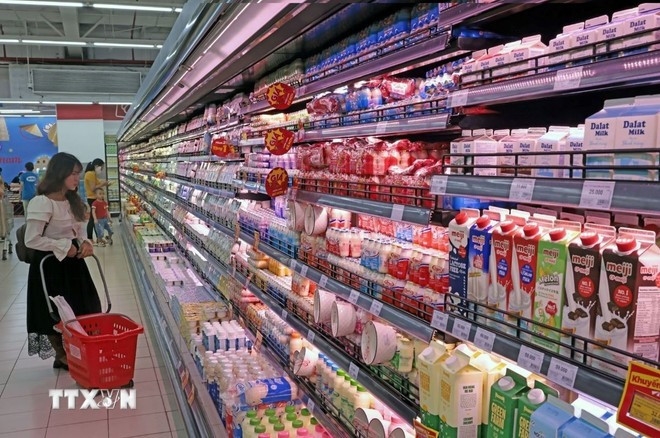Digital transformation for breakthrough growth
To continue accelerating digital transformation and bring greater convenience to consumers, thereby promoting the robust growth of the modern retail market and stimulating domestic consumption, Central Retail Vietnam (CRV) and the National Payment Corporation of Vietnam (Napas) have recently signed a cooperation agreement to implement a cashless payment solution (QR Pay) across modern retail systems. This initiative aims to strengthen the branding of Vietnamese products and boost domestic spending.
    |
 |
|
People shop at a supermarket. |
CRV CEO Olivier Langlet affirmed that Central Retail not only seeks to expand its business operations but also contributes to modernizing Vietnam’s retail sector and bringing consumers closer to modern shopping standards. Through the rollout of VietQR Pay in its retail network, it not only provides a more convenient payment experience but also joins the Government’s efforts to promote a cashless payment culture, thereby stimulating domestic demand.
Similarly, in response to new consumer trends, AEON Vietnam has been accelerating its digital transformation in operations and introducing a variety of attractive promotions for customers. Accordingly, customers can enjoy an omnichannel shopping experience through multiple platforms such as AEON’s mobile application and its technology partners, the AEON E-Shop channel, as well as phone orders. They can also choose other payment methods, including cash, bank cards, and e-wallets.
According to Tran Thi Phuong Lan, President of the Vietnam Retailers Association, digital transformation in the retail sector is not merely about shifting from traditional to online sales. It is a comprehensive transformation of how businesses operate, ranging from adopting advanced technologies such as artificial intelligence (AI) and big data analytics, to optimizing payment and logistics processes. Technology not only enhances the customer experience but also improves management, data analysis, and the ability to forecast consumer trends, thereby enabling businesses to make more accurate and timely decisions.
Meeting market demands
Currently, Vietnam has approximately 1,270 supermarkets, 270 shopping centers, nearly 250,000 convenience stores, and over 7,500 outlets operated by foreign-invested enterprises such as MM Mega Market, AEON, Lotte Mart, Go! Market, and Tops Market. In addition, there are numerous e-commerce platforms and omnichannel retail chains. The proportion of retail sales through modern channels now exceeds 40% and continues to rise each year, affirming the inevitable trend toward the development of a civilized, modern commercial infrastructure.
Economists forecast that during the 2025-2030 period, Vietnam will maintain an average GDP growth rate of around 8% per year, while the total retail sales of goods and services can grow by more than 12% annually, a rate considered impressive within the region.
At the same time, consumer behavior is shifting significantly, as Vietnamese shoppers are increasingly willing to pay more for high-quality, environmentally friendly products with trusted brands and clear origins.
However, along with opportunities comes numerous challenges, Lan noted, advising retail enterprises to implement multiple strategic solutions simultaneously, with a particular focus on digital transformation, commercial infrastructure development, and enhancing consumer experiences. Optimizing store space, personalizing services, and increasing customer engagement will be key to retaining consumers in the post-pandemic era.
Businesses also cannot overlook the growing trend of green retail and the circular economy. Reducing single-use plastics, optimizing packaging, collecting used products, and prioritizing environmentally friendly suppliers are not only actions for the community but also strategies that help strengthen brand value.
In addition, Lan emphasized the importance of developing high-quality human resources. Technology can change rapidly, but people remain the foundation. The retail workforce must undergo continuous retraining in digital skills, data analysis, and smart customer care to adapt to the new era.
To ensure sustainable market development, the State needs to continue improving the legal framework, reforming administrative procedures, and creating a transparent and favorable investment environment, she suggested.
Source: VNA